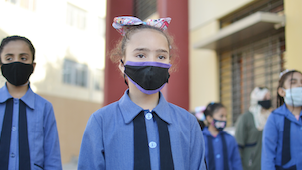
Amman, 19 January 2022 — Schools should be the last sector to close and the first to open to prevent a loss of learning that could impact children for years to come, called the heads of UN agencies and the World Bank in Jordan today.
All agencies and the World Bank recognized the efforts made to date by the Government of Jordan to prioritize school opening, with significant investments made to date to ensure that the necessary measures are in place for safe learning and that both children and teachers have the skills and tools they need to effectively catch up.
The heads of three UN agencies in Jordan – UNESCO, UNICEF and WHO – and the World Bank called on the Government of Jordan to avoid reversing years of progress in education by continuing to apply the safe reopening framework that seek to keep in-person learning at schools available for the majority of students. The longer that COVID-19 measures keep classrooms closed in Jordan, the greater the impact on children and youth.
“Time is of the essence to help children who have already lost almost two years of in-person learning. The focus must be on getting the most vulnerable children who are facing a shadow pandemic of child labour, early marriage and mental health issues, and are most at risk of dropping out, back to school,” said Tanya Chapuisat, Representative, UNICEF Jordan.
“The COVID-19 pandemic has already placed restrictions and immense pressures on children everywhere. Returning to school should be an exciting time for them and contributes to their physical and mental development. It’s where they get to learn, grow, interact with others. School closures in Jordan should not be considered an option like they were earlier in the pandemic, given that the country has been a regional leader in effectively preparing schools for reopening, with high vaccination coverage, guidance and training for teachers; hygiene and sanitation materials; as well as physical distancing and rotation,” said Dr Jamela Al-Raiby, WHO Representative to Jordan.
“Early indications from the recent mid-term review of Jordan’s Education Strategic Plan (ESP) already point to alarming learning and equity losses due to the pandemic. Stronger prioritization on reopening schools and keeping them open and mainstreaming of remedial education approaches within public schools will be critical especially for children from low-income households, children with special needs, and refugee children,” said Min Jeong Kim, Representative, UNESCO Jordan.
“Disruptions to instructional time in the classroom can have a severe impact on a child’s future ability to learn. Learning losses can far exceed the actual school closure time. The pandemic threatens to undo years of hard-earned progress in the education sector in Jordan, and further closures might reverse the important progress of remediation efforts and result in additional learning losses,” said Holly Benner, Resident Representative to Jordan, The World Bank.
The cost of keeping schools closed is significant as children who fall behind in their education are more likely to drop out, affecting Jordan’s human capital outcomes and the ability of young people to access jobs and economic opportunities in the longer term. Simulations suggest that students have lost up to 0.9 years of schooling in Jordan, adjusted for quality. It is estimated that in Jordan students’ future earnings may fall as much as 8 percent.
School closures disproportionately affect younger children, those with limited digital access, children with disabilities, girls, refugees, and children living in poverty. School is critical for children beyond learning – it helps them to socialize and develop, and for some children, school is the only place where they feel safe.
The multilateral agencies reiterated their continued support to the Ministry of Education to get all children back to learning in the second semester as soon as possible.
###
For more information, please contact:
UNICEF
Dima Salameh
This e-mail address is being protected from spambots. You need JavaScript enabled to view it
+962 79 984 1703
WHO
Banan Kharabsheh
This e-mail address is being protected from spambots. You need JavaScript enabled to view it
+962799324142
UNESCO
Bettina Kittel
This e-mail address is being protected from spambots. You need JavaScript enabled to view it
+962795673320
WORLD BANK
Nabeel Darweesh
+962-798-277-215
This e-mail address is being protected from spambots. You need JavaScript enabled to view it
About WORLD BANK
For more information
Visit us on Facebook
Be updated via Twitter
For our YouTube channel
About UNESCO
UNESCO is the United Nations Educational, Scientific and Cultural Organization. It seeks to build peace through international cooperation in education, scientific collaboration, cultural dialogue and the free flow of information.
About WHO
WHO leads global efforts to expand universal health coverage. We direct and coordinate the world’s response to health emergencies. And we promote healthier lives – from pregnancy care through old age. Our Triple Billion targets outline an ambitious plan for the world to achieve good health for all, using science-based policies and programmes.
For more information about WHO Jordan
Follow WHO Jordan on Twitter, Facebook and Instagram
About UNICEF
UNICEF works in some of the world’s toughest places, to reach the world’s most disadvantaged children. Across 190 countries and territories, we work for every child, everywhere, to build a better world for everyone.
For more information about UNICEF and its work for children,







